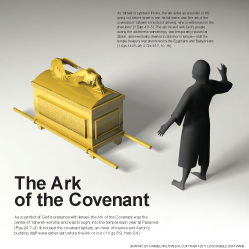4:1–7:2 The next three chapters interrupt the narrative about Samuel, who will reemerge in 1 Sam 7 as Israel’s new leader. Chapter 4 reports the fulfillment of God’s judgment against the house of Eli. Chapters 5–6 focus on the ark of the covenant, which has been captured by the Philistines. |
4:1–11 The Israelites’ fight against the Philistines is not going well. They call for the ark to be brought to the battlefield, and Hophni and Phinehas come along with it. They are killed in the ensuing slaughter, and the ark is captured. |
4:1 the word of Samuel came to all Israel Ties this chapter thematically with ch. 3. Samuel is absent from the next three chapters, emblematic of Israel as a people without a prophet in the time of the judges.
Now Israel went out The beginning of the next section of the narrative.
the Philistines The Israelites’ archenemies during this time.
The Philistines likely were among the Sea Peoples |
4:2 The Philistines lined up for the battle to meet Israel The first confrontation between the Israelites and the Philistines in 1–2 Samuel. With the exception of a few brief periods of peace, these two groups continuously engage in warfare.
four thousand men This staggering loss is only the beginning of Israel’s defeat.
4:3 the ark of the covenant of The Israelites treat the ark as a good luck charm rather than giving it the respect it deserves. See note on Exod 25:10.
as a good luck charm rather than giving it the respect it deserves. See note on Exod 25:10.
4:4 who sits between the cherubim Refers to the cherubim on the ark (see Exod 25:17–22). The Israelites apparently believed that having the ark close by would make it more likely that God would help them.
the two sons of Eli, Hophni and Phinehas Their introduction in a battle scene recalls the prophecy concerning their death (1 Sam 2:33–34) and signals disaster.
4:5 the earth shook Indicates that the sound of their rejoicing could be felt in the ground.
4:7 God has come to the camp The Hebrew word used here, elohim, can refer to Yahweh, a particular unnamed god, or multiple pagan deities (gods). The Philistines probably are thinking of multiple gods (elohim); it seems unlikely that they would have properly identified Israel’s God or viewed Him as the supreme deity.
4:8 the same gods who struck the Egyptians Although the Philistines likely believe that multiple gods rescued the Israelite people from Egypt, they still show an awareness that the Israelites’ rescue was a divine act. The Philistines fear the same sort of reprisals the Egyptians experienced.
in the desert Misidentifies the setting for the plagues. This mistake, along with the likely reference to polytheism, could be indented to show the Philistines’ ignorance.
4:9 be men, you Philistines This seems to strengthen their resolve to defeat Israel and their God.
4:10 Thirty thousand foot soldiers In their second skirmish, the Philistines obliterate the Israelite forces.
4:11 Hophni and Phinehas, died Fulfills the details of the prophecy in 2:33–34.
4:12–22 Upon hearing about the ark’s capture, Eli falls over and dies. |
4:12 to Shiloh The final mention of this place in 1–2 Samuel (with the exception of a reference to Eli in 14:3).
Shiloh was likely destroyed by the Philistines contemporary to the battles described in ch. 4. Other passages in the ot allude to Shiloh’s destruction (e.g., Jer 7:12–14; 26:6, 9). Psalm 78:58–61 states that God abandoned Shiloh because of Israel’s idolatry. It also refers to the capture of the ark (1 Sam 4:11). After the ark is returned, it is kept in the house of Abinadab in Kiriath-jearim—not Shiloh—for roughly 20 years (7:1–2). Samuel operated out of Ramah rather than Shiloh, also suggesting that Shiloh was destroyed, perhaps as part of God’s judgment (see 7:17). However, Shiloh may have later been partly reconstructed, since it is mentioned as the home of Ahijah during Jeroboam’s reign (circa 930–909 bc; 1 Kgs 14:2,4). |
clothes were torn and earth was on his head Signs of mourning.
4:13 his heart was anxious about the ark of God Eli is concerned for the ark, not his sons. See 1 Sam 4:18.
4:17 Israel has fled before the Philistines The report comes to Eli in four parts, each more tragic than the one that precedes it: Israel has fled, many troops have died, his sons have been killed, and the ark of God has been captured.
4:18 he fell from his chair backwards The narrative artfully portrays the fall of Eli’s line by speaking of Eli’s literal tumble.
 Judges and Their Rule Table
Judges and Their Rule Table
He broke his neck God also breaks the neck of the statue of Dagon (5:4).
heavy A play on words. The Hebrew term used here, kaved, can describe being important, oppressive, or weighty. Eli seems to have been all three. He was important; he and his sons dealt oppressively with the people (2:12–17); and he apparently was overweight from eating sacrificial meat (2:29).
4:19 the capture of the ark of God The narrative lists the capture of the ark first, perhaps hinting that this was the greatest tragedy of the day. The structure of this verse suggests this may have been the most significant loss to Phinehas’ wife as well (compare 2:22; 4:21–22).

|
About Faithlife Study BibleFaithlife Study Bible (FSB) is your guide to the ancient world of the Old and New Testaments, with study notes and articles that draw from a wide range of academic research. FSB helps you learn how to think about interpretation methods and issues so that you can gain a deeper understanding of the text. |
| Copyright |
Copyright 2012 Logos Bible Software. |
| Support Info | fsb |
 Loading…
Loading…


 Philistines
Philistines 

 Shiloh
Shiloh